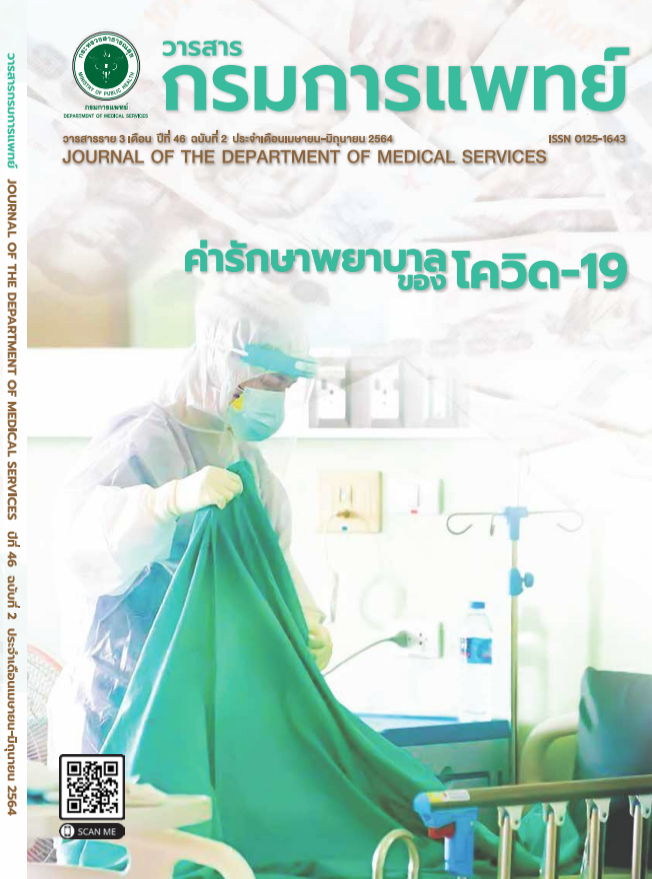Effect of Developmental Program using Developmental Assessment for Intervention Manual (DAIM) and Adult Learning Theory in High Risk Newborn
Keywords:
Preterm Infant, Developmental program using Developmental Assessment for Intervention Manual (DAIM), Adult Learning Theory, CaregiversAbstract
Background: High risk newborn are children with birth asphyxia or birth weight less than 2,500 gram. It’s the main cause delay development in children. Objective: The quasi-experimental research, pre-test post-test design aimed to study effect of developmental program using Developmental Assessment for Intervention Manual (DAIM) Method: The participants of this study consisted of 30 child and their parents were admitted at Queen Sirikit National Institute of Child Health, was purposively selected. The subjects were divided into two groups, control and experimental, containing 15 subjects each. The tools used in this study consisted of 1) General information 2) Developmental program using Developmental Assessment for Intervention Manual (DAIM) and Adult Learning Theory in high risk newborn 3) Knowledge questionnaire 4) Behavior questionnaire 5) Telephone interview form, was study 8 weeks. Data were analyzed using the McNemar Test, the Mann-Whitney U Test, and the Wilcoxon Matched Pairs Signed-Ranks Test. Result: showed that 1) High-risk newborn in DAIM group exhibited age-appropriate development with statistical significance (p < .05) 2) High-risk newborn in DAIM group significantly exhibited better development than those in control group (p < .05) 3) DAIM group parents or caregivers showed markedly higher knowledge and behavior assessment scores after receiving the program (p < .05) 4) Parents or caregivers in DAIM group exhibited remarkably higher knowledge assessment scores than those in control group (p < .05) but behavior the results between the experimental and control group were not statistically different. Conclusion: Developmental program using Developmental Assessment for Intervention Manual (DAIM) and Adult Learning Theory in high risk newborn is a tool to help nurse have guidelines and apply them in surveillance and development.
References
Office of Inspection and Evaluation Office of the Permanent Secretary.Guidelines for project implementation Promoting child development in honor of HRH Princess Maha Chakri Sirindhorn The Royal Crown Prince Opportunity to celebrate the 5th Cycle, 2 April 2015, 2016, Nonthaburi.
Rajanagarindra Institute of Child Development, Ministry of Public Health,Department of Mental Health. Thai development skills inventory for children from birth to five years; 2010.
Feldman R, Eidelman AI. Intervention program for premature infants. How and do they affect development? Clinics in Perinatology; 1998.
Knowles MS, Swanson RA, Holton EF. The adult learner: the definitive classic in adult education and human resource development 7th ed. London: Elsevier; 2011.
Chawaphanth S. Surveillance and Promotion of Early Childhood Using Andragogy. J Nurs Sci 2018; 36: 4-17.
Busaba Authavee, Bampen Phongphetdit. The use of the DSPM to promote child development, 5th Regional Health Promotion Center, Ratchaburi; 2017
Anita J. Hughes. Moter Development Interventions for Preterm Infant: A Systematic Review and Meta-analysis; 2016.
Brooks-Gunn J, Liaw FR, Klebanov PK. Effects of early intervention on cognitive function of low birth weight preterm infant. J Pediatr 1992; 120:350-9.
Thawittha L. Preterm infant development promoting behaviors among primary caregivers and related factors. Nursing Journal; 2016.
Paiprasert S. Factors affecting development of children aged 0-3 years old in Health Inspection Region 18. Journal of Pediatrics; 2012.
Sakolwasan U. Knowledge, Self-efficacy, and Behaviors in Promoting Preterm Infant Development Among Primary Caregivers. Chiang Mai University; 2007.
Sutalangka M. Maternal Care and Related Factors in Developmental Care of Preterm Infants. Nursing Journal; 2017.
Downloads
Published
How to Cite
Issue
Section
License
Copyright (c) 2021 Department of Medical Services, Ministry of Public Health

This work is licensed under a Creative Commons Attribution-NonCommercial-NoDerivatives 4.0 International License.
บทความที่ได้รับการตีพิมพ์เป็นลิขสิทธิ์ของกรมการแพทย์ กระทรวงสาธารณสุข
ข้อความและข้อคิดเห็นต่างๆ เป็นของผู้เขียนบทความ ไม่ใช่ความเห็นของกองบรรณาธิการหรือของวารสารกรมการแพทย์



